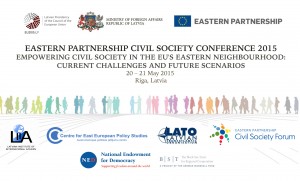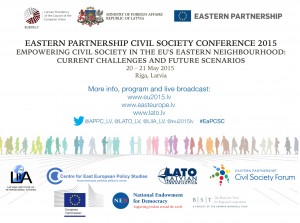
On 20-21 May, the European Union’s Eastern Partnership (EaP) Civil Society Conference will be held in Riga and attended by over 300 civil society representatives and experts from the EU Member States and EaP countries – Armenia, Azerbaijan, Belarus, Georgia, Moldova and Ukraine. During the conference, recommendations will be drawn up for the EU institutions and EU and EaP member state governments to propose more effective ways of achieving the Eastern Partnership’s objectives.
The goal of the Conference is to help strengthen civil society and involve it in the planning and implementation of the Eastern Partnership policy. The staging of this event in Latvia, the country currently holding the EU Council Presidency, continues the practice initiated during the Lithuanian Presidency of organising a broad-scale Civil Society Conference in parallel with the Eastern Partnership Summit to discuss issues closely related to the themes of the Summit. The Civil Society Conference provides a platform for representatives of civil society, non-governmental organisations and think tanks to debate Eastern Partnership issues.
The topics to be discussed at the Conference include past achievements and current challenges facing the EU Eastern Partnership policy from a civil society perspective, possibilities for the EaP and the role of civil society in the process of strengthening regional security, and future topical issues of Eastern Partnership policy.
During the Conference, discussions will be conducted in working groups in which representatives of Eastern Partnership countries will deliberate on the topical questions of democratic change and necessary improvements in the EaP region. Particular attention will be paid to the issues of democracy, strengthening human rights and the rule of law, social and sustainability factors in the economic development of the EaP countries, and strengthening cross-border ties and the exchange of opinions.
Politicians and experts from EU and EaP countries will speak at the conference, which will be opened by the Prime Minister of the Republic of Latvia, Laimdota Straujuma.
The Eastern Partnership Civil Society Conference in Riga is organised in cooperation with the Latvian Institute of International Affairs, the Centre for East European Policy Studies and the Latvian Transatlantic Organisation, with the participation of the Eastern Partnership Civil Society Forum. The conference is supported by the European Commission, the Ministry of Foreign Affairs of the Republic of Latvia, the Secretariat of the Latvian Presidency of the Council of the European Union, the Black Sea Trust, a Project of the German Marshall Fund of the US and the National Endowment for Democracy.
Accreditation for the Conference is open and available for media representatives here.
Accreditation for the conference is open until 12 May. Media programme available here.
Further information on the event will be available on the Internet pages of the Conference organisers, the Latvian Presidency of the Council of the European Union and the Ministry of Foreign Affairs of the Republic of Latvia.
About the EU’s Eastern Partnership
The Eastern Partnership is part of the European Neighbourhood Policy initiated in 2004 with the objective of avoiding the emergence of strict dividing lines between the EU Member States and their neighbouring countries, thereby strengthening the prosperity, stability and security of the whole region. The European Neighbourhood Policy is based on the values of democracy, the rule of law, and respect for human rights. It is chiefly a body of bilateral relationships between the EU and each partner country, further complemented by regional and multilateral cooperation initiatives and forums.
The decision to establish the Eastern Partnership, with the aim of promoting political association and economic integration with the EU’s eastern neighbours, was taken by the EU Heads of State and Government in May 2009 in Prague. The Eastern Partnership involves Armenia, Azerbaijan, Belarus, Georgia, Moldova, and Ukraine.
About the organisers
The Latvian Institute of International Affairs (LIIA) was established in May 1992 in Riga as a non-profit foundation charged with the task of providing decision-makers, experts, and the wider public in Latvia with analysis, recommendations and information about international developments, regional security issues, and foreign policy strategy and choices. It is an independent research institute that conducts research, issues publications, and organises lectures, seminars and conferences related to international affairs. The LIIA is Latvia’s oldest think tank and one of its best-known and internationally recognised institutions. It is especially renowned as the leading think tank specialising in international affairs. In its efforts to provide expertise from a Latvian perspective, the Institute and its fellows have participated in and coordinated various international research projects. The Institute has recently been focusing on such research themes as Latvian foreign policy, transatlantic relations, European Union policies, including its Neighbourhood Policy and the Eastern Partnership, multilateral and bilateral relations with Russia, and various energy issues.
www.liia.lv
https://www.facebook.com/LIIA.lv
@LIIA_LV
The Centre for East European Policy Studies (CEEPS) is a non-governmental organisation which began its research activities in 2006. Its main goals are: to contribute to the development of Latvian foreign policy by carrying out research into the politics, history and economics of East European countries; to develop cooperation with Latvian and foreign research institutes and other organisations; to identify and explain Latvia’s interests to foreign countries. So far, CEEPS researchers have concentrated on studying issues related to Russia’s soft power, compatriots and media policy. The Centre cooperates with research centres in Estonia, Lithuania, Moldova, Georgia, Ukraine and other countries, and organises various local and international seminars and discussions in which experts take part. CEEPS representatives are regularly invited as experts to present their opinions in the media and to deliver lectures at various conferences, seminars, discussions and other events in Latvia and abroad.
www.appc.lv
https://www.facebook.com/CentreForEastEuropeanPolicyStudies
@APPC_LV
The Latvian Transatlantic Organization (LATO) is a non-governmental organisation that brings together like-minded individuals who want to promote Latvia`s membership of NATO. LATO aims to inform Latvian society about NATO and Latvia`s membership of the Alliance, to promote cooperation with other countries in order to inform the citizens of these countries about Latvia as a NATO member state, and to organise public information events about topical Latvian and Euro-Atlantic security policy issues. In 2011, LATO was granted ‘public benefit organisation’ status in the field of civil society development in appreciation of its goals and performance over its period of operation. This also enables it to strengthen and develop cooperation with corporate partners.
www.lato.lv
https://www.facebook.com/LatvianTransatlanticOrganisation
@LATO_LV
